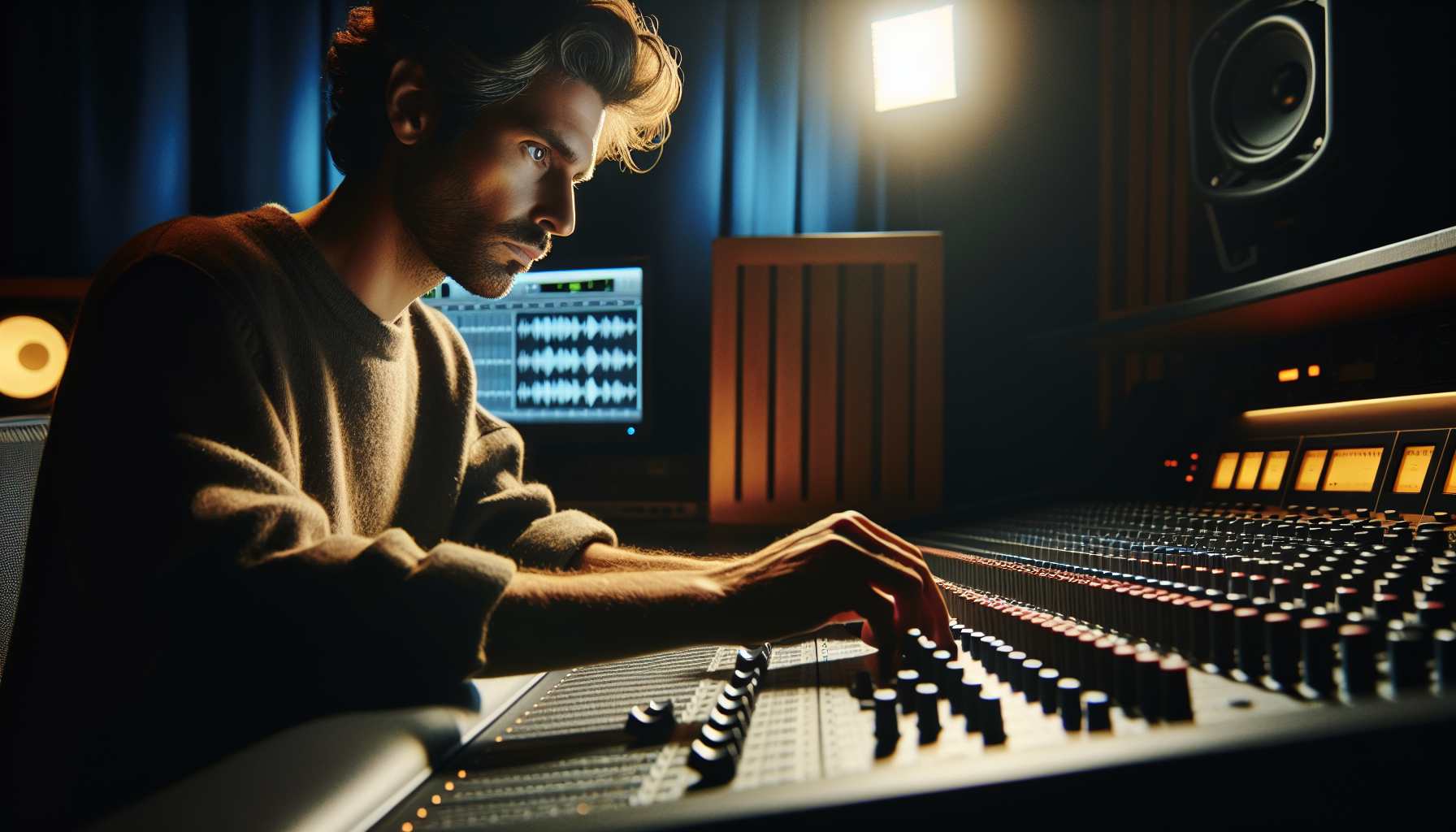Mastering Engineers: Essential Skills for Superior Sound Quality
Mastering engineers are pivotal in the music production process, ensuring your tracks sound exceptional on any playback system. This role requires a unique set of skills to enhance sound quality and bring a polished finish to the final mix. In this article, we explore what mastering engineers do, their indispensable tools and techniques, and the impact they have on your listening experience. Whether you're looking to hire a mastering engineer or step into their world, you'll find valuable insights on advancing in this specialized field.
Key Takeaways
-
Mastering engineers polish audio productions, ensuring they sound great across various playback systems and adjust the final mix with tools like EQ and compression.
-
A successful mastering engineer must combine technical skills with a strong ear for music and excellent communication skills for effective collaboration.
-
Staying current with trends and technology, expanding your portfolio, and networking are crucial for a mastering engineer seeking to build a successful career.
The Role of a Mastering Engineer in the Music Industry

Mastering engineers play a vital role in the music industry, turning raw tracks into polished gems. They put the final touches on audio productions, ensuring top-notch sound quality, and preparing tracks for a variety of playback systems. As music production and audio engineering have evolved, the mastering engineer's role has become more creative, expanding their influence and shaping the art of sound.
Professional mastering engineers are entrusted with the mastering process due to their expertise in enhancing the final mix. They specialize in tailoring the music for various sound systems, and they have the skillset to master music to its maximum potential. This is why mastering music is a big deal in the music industry. It's like the fine-tuning of a musical instrument, ensuring that every note hits the right chord with listeners.
Understanding the Mastering Process
The art of audio mastering isn't as simple as it might seem. It's a process that requires critical listening and a deep understanding of sound manipulation techniques. Mastering engineers use a range of tools, including:
-
Equalization, which balances the sound of the song
-
Compression and limiting, which enhance the mix's fullness, loudness, and cohesion, making it more impactful
-
Reverb, which adds a sense of space to the mix
-
Distortion, which can add warmth or grit to the sound
-
Stereo widener, which expands the stereo image
-
Filters, which can shape the frequency response
These tools are used by a mixing engineer to tweak and improve the mix according to the client's vision.
However, the mastery lies not just in using these tools but also in the strategic application of them. Take, for example, the process before exporting a mix for mastering: It is vital to declutter the master bus by removing any non-essential plugins, maintain a headroom of about -3 dB, and deactivate dither. This prepares a better listening environment for the mastering engineer.
Additionally, mastering engineers pay close attention to sequencing and spacing, which define the order of tracks, the silence between them, and song fades. These seemingly small details can significantly impact the final product's quality, especially in an engineered album.
The Impact of Mastering on Playback Systems
Imagine listening to your favorite track on a high-end home theater system; it sounds perfect, right? But what if it sounds distorted or muffled when you switch to your headphones or car speakers? That's where mastering comes in. Mastering engineers work to achieve a consistency in the music across various playback systems, resulting in a uniform listening experience for the audience. They have a keen ear for details that might get lost or create distortion on different systems, like too much sub-bass on certain speakers or instruments getting lost in mono.
Moreover, a good mastering engineer is an expert in optimizing tracks for various platforms, such as Spotify or YouTube. They know how to avoid the common pitfalls that could affect your listening experience on these platforms, like inter-sample peaks that could cause distortion. So, the next time your favorite song sounds just as good on your phone as it does on your home theater, remember to thank one of the top mastering engineers working in mastering studios!
Essential Skills for Successful Mastering Engineers

So, what does it take to become a successful mastering engineer who can ensure top-quality sound across various platforms? The answer lies in a combination of technical proficiency, deep understanding of sound dynamics, and effective communication skills. Mastering engineers need to know their way around digital audio workstations (DAWs), understand dynamic range and compression techniques, and have the ability to communicate effectively with artists and other industry professionals.
In addition to these, mastering engineers should also:
-
Be familiar with various audio tools
-
Have a good ear for music
-
Be able to navigate through features in DAWs, such as external audio editing software and various audio editing and workflow tools
-
Keep up with industry trends and advancements in technology
After all, mastering engineers are not just technicians; they are artists in their own right, shaping the sound that moves us in the best engineered album.
Digital Audio Workstation Proficiency
Digital audio workstations (DAWs) are the playgrounds for mastering engineers. They use these software platforms to manipulate and enhance sound, providing a one-stop solution for recording, editing, mixing, and mastering. They need to be proficient in using DAWs like:
-
Logic Pro X
-
Reaper
-
Cubase
-
Avid Pro Tools
These are popular choices in the industry.
Mastering engineers utilize the features in DAWs like external audio editing software, the ability to mix all tracks into a single track, and various audio editing and workflow tools. A good command over DAWs not only eases the process of mastering tracks but also influences the final output. It allows them to make adjustments in different parts of the song, ensuring that everything sounds great and improves the overall sound.
Dynamic Range and Compression Techniques
A deep understanding of dynamic range and compression techniques is another essential skill for mastering engineers. Dynamic range refers to the difference in volume between the quietest and loudest sounds in a mix or audio file. Mastering engineers use compression to control the volume range, reducing the dynamic range, and making the loud and soft parts closer in volume.
Compressors and limiters are commonly used tools to tweak the dynamic ranges, improving sound quality. Knowing how to manipulate dynamic range allows mastering engineers to highlight the right range, making the final master sound clear, punchy, and emotionally powerful. This expertise helps in optimizing loudness and sound quality, making the music more enjoyable to the audience.
Effective Communication and Collaboration
Effective interaction and teamwork play a pivotal role in the music industry. Mastering engineers often work closely with artists and other industry professionals, and having good communication skills helps in understanding the vision of the artist and bringing it to life. Some techniques mastering engineers use to improve their communication skills include:
-
Active listening
-
Clear and concise speech
-
Positive language
-
Solution-oriented mindset
By utilizing these techniques, mastering engineers can enhance their communication skills and foster effective collaboration in the music industry.
In the process of mastering, mastering engineers can help artists understand what to expect, use their instincts to make processing decisions, and follow simple steps to work together smoothly. Poor communication can lead to disappointing results and misunderstandings, so it's crucial to ensure a clear line of communication throughout the process.
Building Your Career as a Mastering Engineer
To carve a successful career as a mastering engineer, one needs a fusion of technical expertise, hands-on experience, and thorough knowledge of the industry. It involves gaining ample training and practice in record production, recording, and audio technology. Also, it requires developing a keen ear for mastering, learning about different gear, finding your own sound, getting hands-on experience, being open to feedback, and picking up some business skills.
However, beyond training and skills, a successful career in this field also entails expanding your portfolio and building connections in the industry. Whether it's working on projects that showcase your skills or helping out friends and local artists, every opportunity contributes to your portfolio and professional growth. Networking is equally important, as it opens up new opportunities and collaborations.
Gaining Experience and Expanding Your Portfolio
To gain experience and expand your portfolio, start small and grow steadily. Providing services to acquaintances and local artists can be an opportunity to hone your skills, broaden your network, receive valuable feedback, and potentially secure recommendations for professional assignments. Look for internships, apprenticeships, or entry-level jobs at recording studios or mastering facilities to gain practical experience.
Mentorships can also be beneficial in refining your skills and learning from experienced professionals. Getting involved with local music communities can help you:
-
Connect with musicians and industry peers
-
Get inspired
-
Make important connections
-
Showcase your skills through collaboration on different projects.
Networking and Industry Connections
In the music industry, networking holds significant importance. It's often about who you know, and building relationships can open up new opportunities and collaborations for mastering engineers. You can build connections by showcasing your skills, building a solid portfolio, and engaging with others in the industry online.
Industry connections can help you grow your client base by giving you chances to collaborate, gain more visibility, and form relationships with artists and other music industry professionals. Remember, every conversation is a potential opportunity, so don't hesitate to reach out and build your network!
Staying Updated on Industry Trends and Technology
Given the ever-evolving nature of the industry, keeping abreast of the latest trends and technology is indispensable. Mastering engineers need to keep up with the latest developments to roll with the changes and continuously improve their skills. Some of the latest trends and technologies in the field of audio mastering include:
-
The rise of loudness normalizing
-
The use of artificial intelligence in mastering software
-
The integration of streaming platforms into the mastering process
-
The increasing demand for high-resolution audio mastering
By staying on top of these trends, mastering engineers can remain relevant and competitive in the industry.
Continuous learning and adaptability are key in this fast-paced industry. It's not just about having the skills but also about knowing how to apply them in a changing landscape. So, always keep an ear out for the latest trends and advances in the field!
Choosing the Right Mastering Engineer for Your Project

Selecting an appropriate mastering engineer for your project is pivotal for realizing your envisaged sound. It's not just about technical skills but also about understanding your genre, your vision, and your audience. When considering a potential mastering engineer, it's important to evaluate:
-
Their work experience
-
The gear they use
-
Their training
-
Any significant contributions they've made in the industry
Also, it's important that the mastering engineer is familiar with your genre. Their expertise in that genre can help them highlight specific elements and qualities that are common or sought after in your type of music. If you're going for immersive audio, make sure to hire a mastering engineer who's experienced in this field to ensure top-notch sound.
Evaluating Experience and Expertise
While assessing a mastering engineer's experience and expertise, consider their professional background, equipment they use, and their specializations in different genres. For instance, some industry standards or certifications a mastering engineer should have include Certified Audio Engineer (CEA), Avid Certified Operator for Pro Tools | Post, and Apple Certified Pro - Logic Pro X.
A proficient pro mastering engineer should be well-versed with the following gear:
-
Audio interfaces
-
Digital audio workstations
-
Equalizers
-
Compressors
-
Multiband compressors
-
Limiters
-
Monitors/loudspeakers
Specializing in a genre helps the mastering engineer understand the specific characteristics and requirements of different musical styles, which can significantly impact the final product.
Listening to Past Work and Client Testimonials
Evaluating a mastering engineer's previous work and client testimonials can provide valuable insights into their competencies and work quality. It's not just about the number of projects they've worked on, but also about the quality and influence of their work.
When discussing their past work, ask them about what stood out in their previous projects, what might have been missing or not given enough attention, and why some songs might have felt a bit empty. Understanding their past work can give you a clearer picture of their style and how they can contribute to your project.
Summary
Mastering engineers are the unsung heroes of the music industry, ensuring that every beat, every note, and every nuance of your favorite tracks are just perfect. From understanding the mastering process, the impact of mastering on playback systems, to the essential skills needed and how to build a successful career, we've covered it all. Whether you're an aspiring mastering engineer or an artist looking to understand the process, remember that mastering is both an art and a science. It's about shaping the sound that moves us and creating a listening experience that resonates with the audience.
Frequently Asked Questions
Do I really need a mastering engineer?
Yes, you should consider hiring a mastering engineer if your mix has unwanted noise, improper dynamics processing, or severe tonal imbalances to fix these issues before the mastering process begins.
What is the highest paid mastering engineer?
The highest paid mastering engineer earns a salary of $151,500.
What does a mixing and mastering engineer do?
A mixing engineer fine-tunes individual tracks, while a mastering engineer ensures the final song or album is cohesive and ready for distribution, regardless of the medium or format it's played through. This means making sure it sounds great whether it's vinyl, digital, or streaming.
How can I build my career as a mastering engineer?
To build your career as a mastering engineer, focus on gaining experience, expanding your portfolio, networking within the






